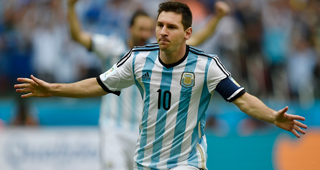Although Argentina’s 4-2 victory over Germany in an early September friendly was scant consolation to the World Cup final loss two months before, it foreshadowed the future of Argentina’s national side for the next Copa America and World Cup cycle. International friendlies have the intensity of a morning jog, and the contrast was especially evident coming off the stakes of the match two months prior. Only four German starters overlapped with the finals, and Argentina played without Lionel Messi.
Nine years after making his international debut, Argentine coaches continue to struggle with getting the best out of Messi. Jose Pekerman famously left Messi on the bench against Germany in the 2006 World Cup quarterfinals, losing on penalty kicks - but Messi was only 18 at the time. Diego Maradona struggled to balance Messi, Gonzalo Higuain, and Carlos Tevez in 2010, and they lost (again) to Germany 4-0. This time around, in light of formation changes and injuries to Sergio Agüero and Angel Di María, Messi moved deeper as the tournament went along. Yes, Argentina advanced to the finals. But alongside a combination of Gonzalo Higuain, Ezequiel Lavezzi and Sergio Aguero, Argentina didn’t score a goal in the semis or the finals.
In the wake of Brazil’s embarrassing defeat to Germany in the World Cup semifinal, Tim Vickery hammered home the point on World Football Phone-In that there was no cohesive style to the Brazilian national side like the German and Spanish champions before. Some of this logic applies to Argentina. Italy won the 2006 World Cup with four players in the starting 11 against France representing Juventus, with the midfield engine of Andrea Pirlo and Gennaro Gattuso pairing at Milan. Seven players from Spain’s starting side against Holland in the 2010 finals came from Barcelona. Six Bayern Munich players started against Argentina in the World Cup final last July, compared with only Javier Mascherano and Messi playing together at Barcelona.
We look for any cohesion to underline the unpredictability of the sport. Germany restructuring their soccer philosophy in 2003, starting at the grassroots level, is well documented. From Julian Draxler to Thomas Müller, the core of the World Cup winning side was developed in the intervening generation. The lure of European soccer (and money) makes it difficult for Argentine domestic soccer to produce a unified core. For the final against Germany, manager Alejandro Sabella fielded a midfield three of Barcelona’s Mascherano, Benfica’s Enzo Perez and Lazio’s Lucas Biglia combining with PSG’s Lavezzi, and Napoli’s Higuain alongside Messi. This trend is known as a “talent doughnut” in the country’s domestic league, where sides are made up of either teenagers about to leave for Europe, or players over 30 returning from Europe. And it makes for what Jonathan Wilson calls “dreadful” matches lacking “rhythm and full of basic errors”.
Messi’s 10 Year Shadow
All contemporary soccer roads circle back to Messi. This mid-October week marks the ten year anniversary of his Barcelona debut against Espanyol as a 17 year old prodigy. Brian Phillips and Sid Lowe wrote of him not as a soccer player but as a singular genius, and the adulation captures a larger point: Messi transcends his athletic ability - he’s an artist of the highest caliber, and maybe even more than that. We speak of his talent in terms of physics and theory, then we get to watch our science experiment every weekend. This, at age 27.
The story of his first contract written next to a pool in Barcelona will be sporting myth that grows in detail with every year. For now, it’s remembered as a tense discussion, with Barcelona’s technical director Charly Rexach pushing hard to sign the 13-year-old who stood under five feet. I imagine future films play this scene through Sorkin-inspired dialogue, with both sides discussing the minutia of a cloud forming above them as a way to reveal their hand. Then each side signs a napkin, Messi’s dad delivers a line of acerbic wit to close the scene, then jump cut to Messi, much smaller than his new teammates, dribbling through them during practice.
Brazil beat Argentina 2-0 in a friendly played in China last week as the World Cup faux redemption tour pushes. This is how sides recover from disappointment on the highest international stage, quietly building for the next four years far away from home. Messi played but missed a penalty, and Sam Tighe points out that Di María fits best with new Argentina manager Gerardo Martino’s vertical style. Regardless, Messi remains the sport’s ultimate pop song. Tomorrow will take care of itself, eventually.



